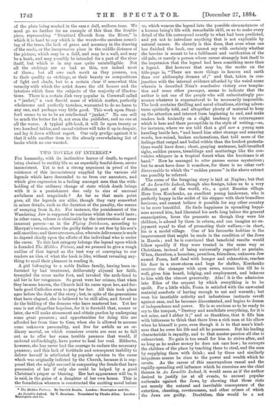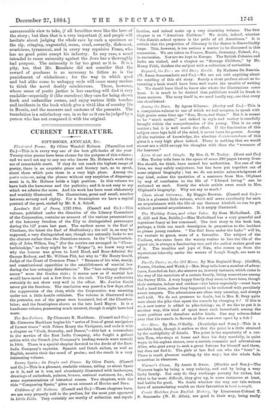TWO NOVELS OF INTEREST.*
FOR humanity, with its instinctive horror of death, to regard being chained to earthly life as an especially fearful doom, seems inconsistent. Yet is not a strong argument in proof of the existence of this inconsistency supplied by the various old legends which have descended to us from our ancestors, and which give expression to a feeling amongst men that the with- holding of the ordinary change of state which death brings with it is a punishment due only to sins of unusual awfulness and magnitude ? As far as that main point goes, all the legends are alike, though they vary somewhat in minor details, such as the duration of the penalty, the means of escaping from it, &c. For instance, the punishment of the Wandering Jew is supposed to continue whilst the world lasts ; in other cases, release is obtainable by the intervention of some innocent person—as in the Flying Dutchman, according to Marryat's version, where the guilty father is set free by his son's self-sacrifice; and there are cases, also, wherein deliverance is made to depend chiefly upon the efforts of the individual who is under the curse. To this last category belongs the legend upon which is founded The Hidden Picture, and we proceed to give a rough outline of that legend as the best way of conveying to our readers an idea of what the book is like, without revealing any- thing to spoil their pleasure in reading it.
A girl belonging to a noble Italian family, having been in- furiated by bad treatment, deliberately abjured her faith, trampled the cross under foot, and invoked the arch-fiend to aid her in her vengeance. So great were her crimes, that when they became known, the Church laid its curse upon her, and for- bade good Catholics even to pray for her. All this took place ages before the date of the story ; but, in spite of the generations that have elapsed, she is believed to be still alive, and forced to do the bidding of the demons who have mastered her. Yet her case is not altogether hopeless, for it is foretold that, sooner or later, she will make atonement and obtain pardon by undergoing some great penance ; and opportunities for doing this are afforded her from time to time, when she is allowed to assume some unknown personality, and live for awhile as an or- dinary mortal, on which occasions events are sure so to fall out as to offer her some terrible penance that would, if endured unflinchingly, have power to heal her soul. Hitherto, however, she has never had the courage to endure the necessary penance ; and this lack of fortitude and consequent inability to deliver herself is attributed by popular opinion to the curse which was originally inflicted by the Church, because it is sup- posed that she might succeed in conquering the fiends that have possession of her if only she could be helped by a good Christian's prayer or blessing. Her last appearance will be, it is said, in the guise of a daughter of her own house. This is the foundation whereon is constructed the exciting novel before
• The Hidden Picture. By Carrick Brodie. London : Remington and Co.
An Israelite butted. By V. Ronalane. Translated by Pbmbe Allen. London Remington and Co. us, which weaves the legend into the possible circumstances of a human being's life with remarkable skill, so as to make every detail of the life correspond exactly to what had been predicted, and yet not to introduce anything that is not explicable by natural causes. So cleverly is this done, that even when one has finished the book, one cannot say with certainty whether the heroine is meant to be a fulfilment and verification of the old tale, or merely a person whose career strangely lent itself to the impression that the legend had been something more than a legend. But however that may be, the motto on the title-page is, "There are more things in heaven and earth than our philosophy dreams of ;" and that, taken in con- junction with the internal evidence afforded by the weird scene wherein is described Nina's conclusive victory over tempta- tion and some other passages, seems to indicate that the author is not one of the people who will unhesitatingly pro- nounce whatever is supernatural to be necessarily impossible. The book contains thrilling and novel situations, stirring adven- tures spiritedly told, and altogether plenty of material to keep up the attention and interest from beginning to end, and make readers look leniently on a slight tendency to extravagance which is here and there perceptible in the style of writing,—as, for instance, where we are told that a girl saw a young man kneeling beside her, "and heard him utter strange and amazing words, low-voiced, broken exclamations, that told more of the feelings that surged and boiled within than the loudest protesta- tions would have done; short, gasping sentences, half-breathed sighs, sudden pauses, tremblings and mutterings like the con- vulsive whispers in a tropical forest when the hurricane is at hand." How he managed to utter pauses seems mysterious ; but he must have done it somehow, for there is no other verb discoverable to which the " sadden pauses" in the above extract can possibly be referred.
The scene of the foregoing story is laid at Naples ; but that of An Israelite Indeed, though also foreign, takes us to a very different part of the world, viz., a quiet Russian village. Here lives Korchenko, an excellent young landowner, who is perfectly happy in the midst of his steppes with their boundless horizons, and cannot believe it possible for any other country to be more beautiful. He finds happiness in spreading happi- ness around him, had liberated his serfs long before the general emancipation, loves the peasants as though they were his children, is adored by them in return, and can imagine no en- joyment equal to that of promoting their welfare,—in short, his is a model village. One of his favourite hobbies is the improvement that might be made in the condition of the Jews in Russia ; and he is convinced that beneficial results would follow speedily if they were treated in the same way as Christians, instead of being universally regarded as pariahs. When, therefore, a homeless, penniless, friendless, unknown Jew named Foma, half dead with hunger and exhaustion, reaches his door in a snow-storm and begs for shelter, Korchenko receives the stranger with open arms, nurses him till he is well, gives him board, lodging, and employment, and behaves to him with the utmost generosity. Alas ! it is the admission into Eden of the serpent by which everything is to be spoilt. For a little while, Foma is satisfied with the unwonted material comforts of having enough to eat and warmth ; but soon his insatiable activity and industrious instincts revolt against ease, and he becomes discontented, and begins to dream of independence and power. He is so envious as to be ready to cry to the tempest, " Destroy and annihilate everything, for it is not mine, and I abhor it;" and so thankless, that it fills him with bitterness to think that there lives a rich man at his elbow when he himself is poor, even though it is to that man's kind- ness that he owes his life and all he possesses. But his leading characteristic is rapacity, and to that master-passion all else is subservient. No gain is too small for him to strive after, and as long as he makes money he does not care how ; he corrupts the children of the place by teaching them to steal, and the men by supplying them with drink; and by these and similarly iniquitous means he rises to the power and wealth which he covets. As the career of this unscrupulous rascal and the rapidly-spreading evil influence which he exercises are the chief themes in An Israelite Indeed, it would seem as if the author desired to justify (or at all events, to excuse) popular outbreaks against the Jews, by showing that those riots are merely the natural and inevitable consequence of the extortion, cheating, covetousness, and other crimes of which the Jews are guilty. Doubtless, this would be a not
unreasonable view to take, if all Israelites were like the hero of the story ; but then that is a very important if, and people will hesitate about judging the whole race by such a specimen as the sly, cringing, ungrateful, mean, cruel, cowardly, dishonest, avaricious, tyrannical, and in every way repulsive Foma, who has no good point except his industry. In any case, a novel intended to rouse animosity against the Jews has a thoroughly bad purpose. The animosity is far too great as it is. It is a pity, too, that Mr. Rouslane did not consider that the reward of goodness is as necessary to fiction as is the punishment of wickedness ; for the way in which good and bad alike come to unhappy ends will cause many readers
to think the novel doubly mischievous. Those, however, whose sense of poetic justice is less exacting will find it very readable—especially if (like ourselves) they care for being shown fresh and unfamiliar scenes, and enjoy various little touches and incidents in the book which give a vivid idea of country life in Russia, and the manners and customs of the peasants. The translation is a satisfactory one, in so far as it can be judged by a person who has not compared it with the original.



































 Previous page
Previous page